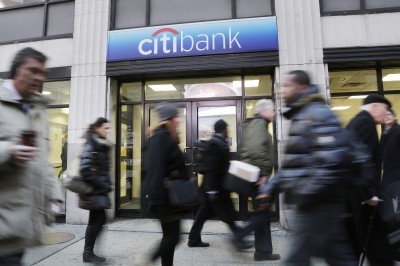-
Tips for becoming a good boxer - November 6, 2020
-
7 expert tips for making your hens night a memorable one - November 6, 2020
-
5 reasons to host your Christmas party on a cruise boat - November 6, 2020
-
What to do when you’re charged with a crime - November 6, 2020
-
Should you get one or multiple dogs? Here’s all you need to know - November 3, 2020
-
A Guide: How to Build Your Very Own Magic Mirror - February 14, 2019
-
Our Top Inspirational Baseball Stars - November 24, 2018
-
Five Tech Tools That Will Help You Turn Your Blog into a Business - November 24, 2018
-
How to Indulge on Vacation without Expanding Your Waist - November 9, 2018
-
5 Strategies for Businesses to Appeal to Today’s Increasingly Mobile-Crazed Customers - November 9, 2018
Citigroup Q1 Profit Falls; But Stock Up
Citigroup has reported the biggest drop in profit among big US banks that have released first-quarter results so far, but lower operating expenses helped the bank beat Wall Street’s low expectations.
Advertisement
Citigroup’s first-quarter net income decreased to $3.50 billion or $1.10 per share from $4.77 billion or $1.51 per share reported previous year.
Analysts on average had expected earnings of $1.03 per share, according to Thomson Reuters I/B/E/S. It was not immediately clear if the results were comparable. Adjusted revenues were $17.56 billion, compared to $19.81 billion previous year.
The lender set aside $2.05 billion for provisions, with a $233 million reserve build largely related to energy loans.
The company’s total operating expenses declined 3 percent to $10.52 billion, as lower expenses in Citi Holdings, lower legal and related expenses and the impact of foreign exchange translation were partially offset by higher re-positioning costs and ongoing investments in Citicorp.
Global consumer banking saw revenues decline 6% to $7.8bn while at the institutional clients group they were down 12% to $8bn.
The bank, like its rivals, has resorted to aggressive cost controls to underpin earnings over the past several quarters as revenue remains weak.
Revenue and earnings declined year over year because of market-driven products, but loans and deposits grew in the company’s core business, CEO Michael Corbat said in a statement.
Earlier in the year, the bank started cutting jobs in the thousands, with as many as 2,000 people left. That is the second worst performer in the KBW Bank Index that tracks 24 large banks. Gerspach told analysts last month to expect a decline of about 25 percent. At the end of 2007, main exposure was to banks, so indirect exposure to real estate was what brought the bank down.
Advertisement
Costs to restructure those and other operations amounted to $491 million, more than the $400 million that Gerspach predicted in March.





























